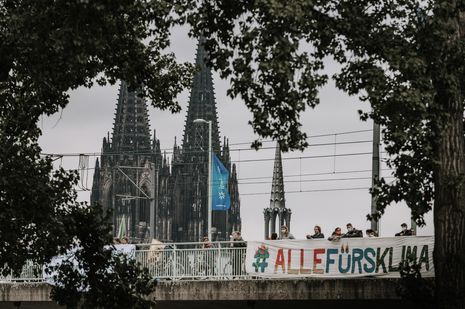Papal Bull? Pope could lead fightback on climate change, new research claims
A papal reinstatement of meat-free Fridays across the global church could significantly reduce greenhouse gas emissions

A new Cambridge University-led study has revealed that a papal reinstatement of meat-free Fridays across the global Catholic Church could prevent millions of tonnes of greenhouse gas emissions annually.
The Christian practice of meat-free Fridays dates back to at least the 9th century, where Pope Nicholas I instated the practice in memory of Christ’s death and crucifixion. Following a 26-year hiatus, the Catholic bishops of England and Wales issued a statement in 2011 to re-establish meat-free Fridays across their congregations. By comparing emissions generated from the average daily diets of meat and non-meat eaters, a recent research study has quantified the climate impact of the declaration: around one quarter of British Catholics changed their dietary habits in response, and it is estimated that over 55,000 tonnes of carbon a year were saved.
Such a dramatic effect–equivalent to 82,000 fewer return trips from London to New York–has resulted in calls for Pope Francis to re-implement this obligation on a global scale.
One must watch this space to see whether religious leaders harness their unique potential
The lead author, Professor Shaun Larcom from Cambridge University’s Department of Land Economy, has commented: “The Catholic Church is very well placed to help mitigate climate change, with more than one billion followers around the world. Meat agriculture is one of the major drivers of greenhouse gas emissions. If the Pope was to reinstate the obligation for meatless Fridays to all Catholics globally, it could be a major source of low-cost emissions reductions.”
But Catholics needn’t worry about getting their protein fix on a Friday, with fish, crabs and even frogs still being permitted. In fact, the McDonald’s Fillet-o-Fish sandwich was invented as a meat-free alternative for Cincinnati-based Catholics observing the practice in 1962.
Furthermore, there is the potential for other religions to adopt similar approaches in supporting the universal fight against climate change. This has been recognised by the co-author Dr Luca Panzone, who remarked: “While our study looked at a change in practice among Catholics, many religions have dietary proscriptions that are likely to have large natural resource impacts. Other religious leaders could also drive changes in behaviour to further encourage sustainability and mitigate climate change.”
Going forward, one must watch this space to see whether religious leaders harness their unique potential for collaboratively stimulating worldwide climate action, and what precedent that would set to others in positions of authority.
 News / Proposed changes to Cambridge exam resits remain stricter than most7 May 2024
News / Proposed changes to Cambridge exam resits remain stricter than most7 May 2024 News / Cambridge students set up encampment calling for Israel divestment6 May 2024
News / Cambridge students set up encampment calling for Israel divestment6 May 2024 Features / Cambridge punters: historians, entertainers or artistes? 7 May 2024
Features / Cambridge punters: historians, entertainers or artistes? 7 May 2024 Sport / The ‘netball girl’: myth or reality?7 May 2024
Sport / The ‘netball girl’: myth or reality?7 May 2024 Theatre / A nuanced and neurodivergent Carrie comes to the ADC6 May 2024
Theatre / A nuanced and neurodivergent Carrie comes to the ADC6 May 2024






